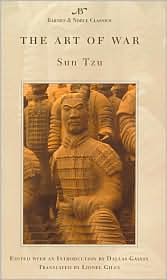As with any traveling, there’s a lot of down time. Whether riding on a train or waiting for a ferry, this gives a lot of opportunity to catch up on some books. For our Greece trip, I brought two.
 The Art of War by Sun Tzu
The Art of War by Sun Tzu
This book is a classic that I’ve heard about for awhile. In fact, I think I remember my old optometrist reading this and recommending it to me over eight years ago. Either way, I saw it on the discount shelf, and decided to give it a whirl.
The book is pretty interesting. Sun Tzu was a general in one of the kingdoms in China around 500BC. He comments that war should be a last resort. And one should find other ways to find a common ground with other people. However, if war must be decided, one should use these tactics.
Here are some of the things I grasped.
– All warfare is based on deception. I guess this goes with the saying that all is fair in Love and War. But, perhaps that was the genius behind such great war leaders as Hannibal or Alexander the Great.
– Know yourself, know your enemy, and you will succeed. Tzu has a whole chapter based on the importance of spies where once must know exactly what your enemy is doing. This is of interest, and I think this compares to the business world, where you need to understand your own strengths and what your competition is doing.
– On the commentary, this was an interesting point. “Knowing yourself allows you to take offensive. Knowing oneself allows you to stand on the defensive. Attack is the secret of defense. Defense is the planning of an attack.” This was an interesting point, meaning that the best defense is to attack, and to go on the defensive is to only give time to plan for the next attack.
– Always be clear in your orders, so you are understood. Don’t allow for any confusion. With that, to put the keenest of spirits up front (high ranking officers) as this will boost the morale of the army. In other words, don’t be afraid to lead by example or by doing the dirty work.
– Some other interesting notes that I saw were that the best soldiers usually will whimper before leaving for war. They feel as if they are going to war to give their lives, and retreat is of no consideration in battle. No looking back. Also, a general will not listen to higher-ups. The general’s goal is to be the victor and must go to the necessary lengths to do this. However, they must not overwork their soldiers or they will not get very far.
 Digital Marketing: Strategies for Success by Godfrey Parkin
Digital Marketing: Strategies for Success by Godfrey Parkin
This book talked about digital strategies that one should take in setting a strategy.The book has a lot of good points.
– When attempting to think about your e-marketing, you should think about your entire strategy. Don’t think that you just need about your website to be successful. You must also include email marketing, social marketing, online advertising, search engine marketing, and search engine optimization.This will depend on your research on your target and how to get them to visit your site.
– To find your strategy: define your mission/vision; review your environment/competition; define your goals with tangible/measurable results; identify your obstacles, create your strategy, and then manage your project.
– 20 % of your customer will come to your site off of email marketing, 20% more will come via advertising, and about half will come through search engines (1/3 will come off PPC, and 1/5 will come via natural search)
– With your website, make usability and information architecture are at the forefront. Also, be sure you are on target with your target. Search engine architecture needs to be built from the beginning. Also, after the site is ready and the SE Architecture is ready, then register your site at dmoz.org.
– Importance of landing pages: build your site so it can easily support and maintain the landing pages. Whether this be a main navigation item or a marketing section, you must be able to create landing pages on the fly. Your email marketing and online advertising should direct to these. And even your SEO and meta tags should be optimized. When the search engine views these pages, they should go within the site, instead of going to the home page all the time.
– This book recommends a double-opt in process in your email marketing to avoid being labeled a spammer and to comply with CAN-SPAM.
– Create interesting subject lines: Front load the subject line (mobile users can only receive so many characters), be clear and direct, and set a deadline. Never use capital letters and no more exclamations. Also, don’t be afraid for A/B testing with subject lines.
– Want to know where the word Spam came from: http://www.youtube.com/watch?v=ljUpN7_6_JU
There were some parts of this book that I completely disliked. He didn’t agree with the use of a CMS for a website, and didn’t provide a good explanation. Also, I felt some of the case studies were a bit optimistic. The real world provides trial and error, and the greatest thing about e-marketing is that you can quickly adjust your campaign to accommodate any changes. It would have been nice to see how he handled failure.
Many other good parts to these books, but I wanted to keep this post relatively small.
